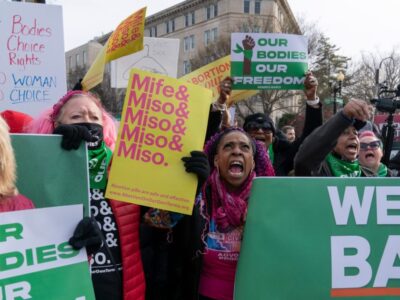
On Monday, Kansas Republicans voted to override Democratic Governor Laura Kelly’s vetoes of four anti-abortion measures. Three bills—which will require doctors to gather and report information from patients about why they are getting an abortion; make it a crime to force someone to obtain an abortion; and allow people to receive tax credits for donations to anti-abortion crisis pregnancy centers—will now become law. And a measure in the state budget reallocating $2 million to crisis pregnancy centers will also move forward, despite the governor’s opposition.
Gov. Kelly and other critics say that the measures will contribute to an erosion of abortion rights—even though, in August 2022, Kansans rejected a referendum to remove the right to abortion from the state constitution. In other words: These bills are an attempt by Kansas Republicans to further stigmatize abortion—and, in doing so, subvert the will of the 59 percent of state voters who already upheld abortion rights. And it’s not the first time: Earlier this year, eight Kansas House Republicans introduced a bill to ban all abortions except those necessary to save the patient’s life, forbid the distribution of drugs that end pregnancies, and allow individuals to file suits against doctors or anyone who helps someone get an abortion (it ultimately died in committee).
“By continuously finding ways to raise the issue and attempting to subvert the will of Kansans,” Gov. Kelly said in a statement provided to Mother Jones, “these legislators are not representing the vast majority of those who elected them to office.”
Anti-abortion group Kansas for Life, though, called the four veto overrides “big wins.”
One of the bills pushed through by Republicans this week, nicknamed the “reasons bill,” will force patients to pick “the most important factor” in their decision to seek an abortion from a set of 11 pre-written options. Patients can decline to answer, and their responses will remain anonymous. Medical facilities will now be required to report the responses twice a year to the state secretary of health and environment. Proponents of that bill—which include anti-abortion groups such as the Alliance Defending Freedom, Kansas Family Voice, and Kansas for Life—say it will facilitate useful insights into what leads people to obtain abortions. But opponents, like Planned Parenthood, say the questions are unnecessary and invasive, and only serve to further stigmatize abortion. They also say the questions are redundant, because data already exists showing why people get abortions: Research from the University of California, San Francisco says “the most common reasons for seeking an abortion are not being able to afford to have a child, the pregnancy coming at the wrong time in life and the man involved not being a suitable partner/parent.”
Gov. Kelly agreed, saying in a statement that she vetoed that bill because “there is also no valid reason to force a woman to disclose to the legislature why she is seeking an abortion.” Rep. Ron Bryce, the original sponsor of the bill, did not immediately respond to questions from Mother Jones Thursday afternoon.
Another bill makes “coercion to obtain an abortion” a crime punishable by up to a year in prison and a fine of up to a $10,000. It defines “coercion” as physical or financial threats of harm or abuse or threat of the legal system. But experts who work in domestic and sexual violence treatment and prevention in Kansas say the bill is too narrow in scope and ignores more common forms of reproductive coercion, including forcing someone to become or stay pregnant and prohibiting their access to birth control. “Ignoring these forms of coercion undermines the effectiveness of the legislation and leaves individuals vulnerable to manipulation and control,” according to testimony against the bill by Sapphire Garcia-Lies, executive director of the Kansas Birth Justice Society.
Additionally, data shows coerced abortions are quite rare in Kansas (and elsewhere): A June 2023 report from the state Department of Health and Environment shows that less than 1 percent of the more than 12,300 abortions in Kansas in 2022 involved reports of “physical, mental, or emotional abuse or neglect.” Kansas Republicans, though, just don’t seem to care—because when Democratic lawmakers introduced two different amendments to broaden the bill’s focus to outlawing reproductive coercion, Republicans in both the House and Senate struck them down.
This isn’t the first time Republicans have tried to co-opt the concept of reproductive coercion in their attempts to restrict abortion access: As I reported back in March—before the Supreme Court heard oral arguments in the case seeking to restrict the availability of mifepristone—anti-abortion activists spread myth and misinformation about why people get abortions in multiple briefs to the high court.
Gov. Kelly said she opposed the coercion bill because “it is already a crime to threaten violence against another individual,” adding she also has concerns that the “vague language” could be marshaled for wrongful criminalization of Kansans. Rep. Rebecca Schmoe, the lawmaker who originally introduced the bill, did not respond to questions.
The other measures Republicans rammed through after the governor’s vetoes include a bill providing a 70 percent state income tax credit for donations to anti-abortion crisis pregnancy centers plus sales tax exemptions to the centers themselves. Republicans also passed a line item in the state budget re–allocating $2 million to CPCs. Anti-abortion crisis pregnancy centers are dedicated to discouraging abortion, often with the help of volunteers—not medical professionals—who peddle misinformation. Gov. Kelly said in statements explaining those vetoes that it is not “appropriate” for the state “to divert taxpayer dollars to largely unregulated crisis pregnancy centers.” Rep. Henry Helgerson, a Democrat who introduced the tax credit bill, and Sen. Jeff Longbine, a Republican who chairs the Financial Institutions and Insurance committee, did not immediately respond to questions about those measures.
Abortion is currently legal in Kansas through 22 weeks’ gestation. But some barriers remain: The state restricts public funding of abortions, and minors need consent from parents or guardians to obtain abortions. The biggest barrier of all, though, may be Republicans in the legislature who seem hell bent on ignoring the rights voters have made clear they want to protect.
“This is a deliberate move to ignore the expressly stated will of the people despite the damaging consequences of these bills,” Micah Kubic, executive director of the American Civil Liberties Union of Kansas, told me this week. “In their defiance of the clearly established right to reproductive healthcare in the our state constitution, these extremist lawmakers remain out of step with the everyday Kansans they serve.”















